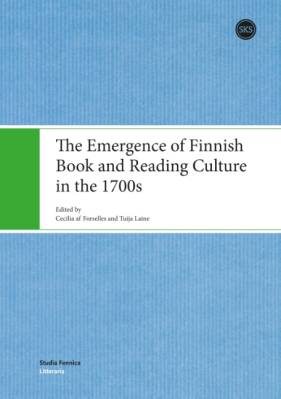The Emergence of Finnish Book and Reading Culture in the 1700s
Forselle, Cecilia af; Laine, TuijaProduct information
| Title: | The Emergence of Finnish Book and Reading Culture in the 1700s | ||
| Authors: | Forselle, Cecilia af (Editor) Laine, Tuija (Editor) |
||
| Product number: | 9789522222411 | ||
| Product form: | Paperback | ||
| Availability: | Delivery in 7-14 workdays | ||
| Price per piece: | 31,00 € (27,31 € vat 0 %) | ||
|
|||
| Publ. product code: | 1390101 |
| Publisher: | Suomalaisen Kirjallisuuden Seura |
| Series: | Studia Fennica, Litteraria 5 |
| Edition: | 1. edition, 2011 |
| Language: | English |
| Pages: | 151 |
| Product family: | Literature Studia Fennica Litteraria Books in English |
| Finnish library classification: | 86.19 Euroopan kirjallisuuden historia ja tutkimus |
| YSO - General Finnish ontology: | kirjahistoria, kirjat, omistus, lukeminen, kaupunkiväestö, porvaristo, kauppiaat, papisto, kirjallisuus, jakelu, myynti, historia |
| Key words: | Book Ownership, History of Reading, The Enlightenment, book history, merchants |
Book culture has emerged as an extremely dynamic and border-crossing field of research, internationally and in Finland. The editors and most of the writers of this book were members of the organizing and program committees of the 18th Annual Conference of the Society for the History of Authorship, Reading and Publishing (SHARP), Book Culture from Below, that took place in Helsinki in 2010. This book provides, for the first time in English, an overview of an important epoch in Finnish book and reading history. Besides depicting book culture at the periphery of Europe, it contributes to our understanding of the power of the urbanized European literary world of the 1700s.
The new reading culture that emerged in Finland during the 1700s affected readers and all levels of society in many ways. Along with other trends, the arrival of translated fiction and Enlightenment literature from Europe opened and irrevocably altered the Finns' world view. The change was especially pronounced in cities. Scholars, merchants, craftspersons, as well as military officers stationed at Helsinki's offshore Sveaborg fortress, acquired world literature and guides intended for professionals at, for example, book auctions.
In this book, researchers from different fields examine the significance and influence of that era's books from cultural, historical, ideological, and social perspectives. What kinds of books did the citizens of Helsinki really buy, loan, and read during the 1700s? What topics and ideas introduced by the new literature were discussed in salons and reading circles? Who were the books' large-scale consumers? Who were the literary opinion leaders of their times? Why did people read? Did the books change their readers' lives?
The new reading culture that emerged in Finland during the 1700s affected readers and all levels of society in many ways. Along with other trends, the arrival of translated fiction and Enlightenment literature from Europe opened and irrevocably altered the Finns' world view. The change was especially pronounced in cities. Scholars, merchants, craftspersons, as well as military officers stationed at Helsinki's offshore Sveaborg fortress, acquired world literature and guides intended for professionals at, for example, book auctions.
In this book, researchers from different fields examine the significance and influence of that era's books from cultural, historical, ideological, and social perspectives. What kinds of books did the citizens of Helsinki really buy, loan, and read during the 1700s? What topics and ideas introduced by the new literature were discussed in salons and reading circles? Who were the books' large-scale consumers? Who were the literary opinion leaders of their times? Why did people read? Did the books change their readers' lives?





